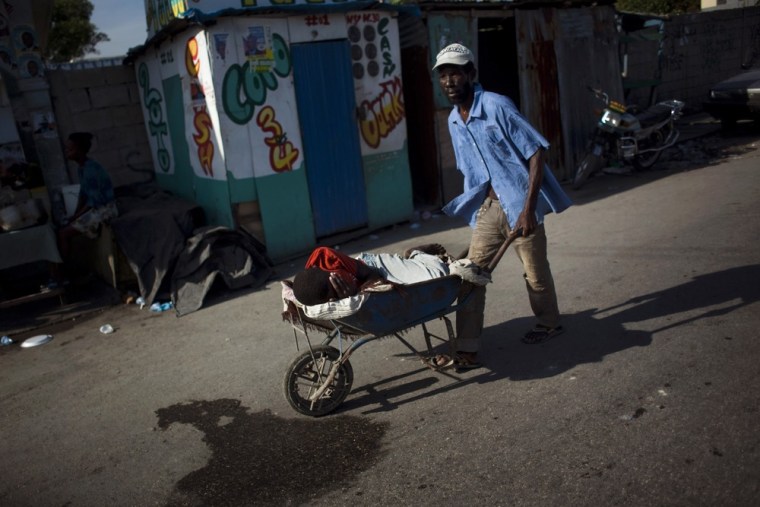Protesters who hold Nepalese U.N. peacekeepers responsible for a deadly outbreak of cholera that has killed 1,000 in three weeks threw stones and threatened to set fire to a base in the country's second-largest city Monday, Haitian radio and eyewitnesses reported.
The protesters also blame the unit for the death of a Haitian youth at the base in August.
Demonstrations began in Cap-Haitien about 6 a.m. local time and within hours paralyzed much of the northern port city, national television reporter Johnny Joseph told The Associated Press by phone. An AP television cameraman trying to reach the area was repelled late Monday by protesters throwing rocks and bottles from a barricade.
"The whole city is blocked, businesses and schools have closed, cars have been burned. It's chaos here," a local businessman in Cap-Haitien, Georgesmain Prophete, told Reuters. There were no immediate details of any casualties.
Demonstrators are also targeting other U.N. bases and Haitian national police stations in the city, he said. U.N. police spokesman Andre Leclerc said the demonstrators blocked traffic in the area.
Radio Kiskeya and Radio Caraibes reported that U.N. soldiers and Haitian police fired tear gas and projectiles to disperse at least 1,000 protesters at the Nepalese base. Joseph said at least three people were injured by Haitian police.
A case of cholera had never before been documented in Haiti, and fear and confusion is following its destructive path. President Rene Preval addressed the nation on Sunday to dispel myths and educate people on good sanitation and hygiene.
Cholera is transmitted by feces and can easily be prevented if people have access to safe drinking water and can regularly wash their hands.
But those conditions don't exist in much of Haiti, and tens of thousands of people have been sickened as the disease has spread across the countryside and to nearly all the country's major population centers, including the capital, Port-au-Prince. Doctors Without Borders and other medical aid groups have expressed concern that the outbreak could eventually sicken hundreds of thousands of people.
The suspicions surround a different Nepalese base located on the Artibonite River system where the outbreak started. The soldiers arrived there in October following outbreaks in their home country and about a week before Haiti's epidemic began.
The U.S. Centers for Disease Control and Prevention found that the strain now ravaging the country matched a strain specific to South Asia, but said they had not pinpointed the origin of the outbreak.
Following an Associated Press investigation, the U.N. acknowledged that there were sanitation problems at the base, but says its soldiers were not responsible for the outbreak. No formal or independent investigation has taken place despite calls from Haitian human-rights groups and U.S. health care experts.
In the Dominican Republic, which shares the island of Hispaniola with Haiti, health officials banned used clothing from being sold in outdoor markets along the shared border as a precautionary measure to stop the disease's spread.
Last week, Dominican health authorities set up hand-washing stations, makeshift clinics, and latrines near vendor stalls on the border between the two countries. On Monday, Health Minister Bautista Rojas added to the safety measures by prohibiting market vendors from selling used clothing and shoes.
The more than 12,000-strong U.N. peacekeeping contingent in Haiti is preparing to provide security for presidential and legislative elections on Nov. 28, and U.N. and government officials have so far insisted the polls will go ahead despite the spreading cholera epidemic.
